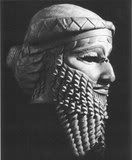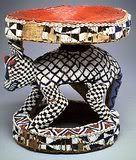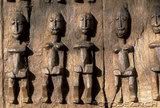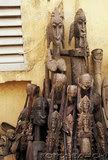Friday, June 1, 2007
African Roots of Humanity and Civilization - Pat VI - Conclusion
CONCLUSION
There is an African proverb that says "Until the lion has his historian, the hunter will always be a hero." I would contend that not nearly enough energy is expended by us on the history of African people, whether in antiquity or modern times. Not nearly enough. All strong peoples emphasize their history all the time; weak peoples do not. Not only must intellectuals do their work, they must give the information to the masses. I believe that as Africans, if we are to be a strong people again, we must continually clarify who we are and where we are, and constantly emphasize the things that made us great in the past. Some peoples have gone as far as to essentially make their history sacred. No one questions the right of a people to engage in this process. Europeans, Chinese, etc., do it all the time as a matter of course. Even Malcolm X said, "Of all our studies, it is history that is most qualified to reward our research." And this is not just ancient history that Malcolm X was talking about, but history ancient and modern. Our greatest leaders and intellectuals, including David Walker, Martin Robison Delany, Edward Wilmot Blyden, Marcus Garvey, J.A. Rogers, Drusilla Dunjee Houston, Carter G. Woodson, W.E.B. DuBois, Kwame Nkrumah, Kwame Ture, Cheikh Anta Diop, Chancellor Williams, John Henrik Clarke, and many, many more were clear on this. Nkrumah, however, took it a step further and clarified the matter unmistakably when he said that "Thought without practice is empty, and action without thought is blind." I believe that we must use our history, not just for intellectual purposes, but to galvanize our people into action to solve our current problems. In other words, we must use our history as a springboard for struggle. I do not pretend to speak for everyone on this matter, but I do feel quite strongly about it. Nobody in their right mind would argue that we can simply return to the past. But certainly we must look at the past in another light. I say that history is a light that illuminates the past and key that unlocks the door to the future. We need that light and we need that key. Not only must we emphasize our historical greatness as a people, as well as analyze the mistakes that we have made, we must inject it into the minds of the masses of our people and build upon it. This is a fundamental step in our liberation process.
Africa will never be free until Africans outside of Africa are effectively integrated into the African liberation movement. At the same time, Africans scattered outside of Africa will not be free until Africa itself is free. And by African freedom I am talking about the complete unification of all Africa with her vast mineral resources utilized for and by African people. I believe that we must all, each one of us, see ourselves as endowed with a sacred mission in regards to African liberation. Mine, as a conscious African historian, is to help make Africans proud of themselves, to help change the image of Africa in the world at large, and, through the use of history and culture, clarify our identity as a people, and help reunite a family of people that has been separated far too long. Obviously, our individual missions will vary. But I am clear on mine. I believe that Ancestors have given me a divine task and I do not intend to flunk it. Thank you very much sisters and brothers.
http://blackherbals.com/african_roots_of_humanity
_and_ci.htm
REFERENCES
Ben-Jochannan, Yosef A.A., and John Henrik Clarke. New Dimensions in African History: The London Lectures of Dr. Yosef ben-Jochannan and Dr. John Henrik Clarke. Edited with an Introduction by John Henrik Clarke. Trenton: Africa World Press, 1991.
Clarke, John Henrik. Notes for an African World Revolution: Africans at the Crossroads. Trenton: Africa World Press, 1991.
Clarke, John Henrik. African People in World History. Baltimore: Black Classic Press, 1993.
Diop, Cheikh Anta. The African Origin of Civilization: Myth or Reality. Translated from the French and edited by Mercer Cook. Translator's Preface by Mercer Cook. Westport: Lawrence Hill, 1974.
Diop, Cheikh Anta. Black Africa: The Economic and Cultural Basis for a Federated State. Westport: Lawrence Hill, 1976.
Diop, Cheikh Anta. The Cultural Unity of Black Africa: The Domains of Patriarchy and of Matriarchy in Classical Antiquity. Introduction by John Henrik Clarke. Afterword by James G. Spady. Chicago: Third World Press, 1978.
Diop, Cheikh Anta. Precolonial Black Africa: A Comparative Study of the Political and Social Systems of Europe and Black Africa, from Antiquity to the Formation of Modern States. Translated from the French by Harold J. Salemson. Westport: Lawrence Hill, 1987.
Diop, Cheikh Anta. Civilization or Barbarism: An Authentic Anthropology. Translated from the French by Yaa-Lengi Meema Ngemi. Edited by Harold J. Salemson and Marjolijn de Jager. Foreword by John Henrik Clarke. Westport: Lawrence Hill, 1991.
Finch, Charles S. III. The African Background to Medical Science: Essays on African History, Science and Civilizations. Preface by Ivan Van Sertima. London: Karnak House, 1990.
Finch, Charles S. III. Africa and the Birth of Science and Technology: A Brief Overview. Decatur: Khenti, 1992.
Hansberry, William Leo. Pillars in Ethiopian History: The William Leo Hansberry African History Notebook, Vol. 1. Preface by Joseph E. Harris. Edited by Joseph E. Harris. Washington, D.C.: Howard University Press, 1974.
Hansberry, William Leo. Africa and Africans as Seen by Classical Writers: The William Leo Hansberry African History Notebook, Vol. 2. Preface by Joseph E. Harris. Edited by Joseph E. Harris. Washington, D.C.: Howard University Press, 1977.
Hilliard, Asa G. III. The Maroon Within Us. Baltimore: Black Classic Press, 1994.
Houston, Drusilla Dunjee. The Wonderful Ethiopians of the Ancient Cushite Empire. Book 1, Nations of the Cushite Empire. Marvelous Facts from Authentic Records. Oklahoma City: Universal Publishing, 1926; rpt. Introduction by W. Paul Coates. Afterword by Asa G. Hilliard III. Commentary by James G. Spady. Baltimore: Black Classic Press, 1985.
Jackson, John G. Introduction to African Civilizations. Introduction and Additional Bibliographical Notes by John Henrik Clarke. Secaucus: Citadel, 1970.
Jackson, John G. Ages of Gold and Silver and Other Short Sketches of Human History. Foreword by Madalyn O'Hair. Austin: American Atheist Press, 1990.
James, George G.M. Stolen Legacy: The Greeks Were Not the Authors of Greek Philosophy, But the People of North Africa, Commonly Called the Egyptians. 1954; rpt. San Francisco: Julian Richardson Associates, 1985.
Parker, George Wells. The Children of the Sun. Omaha: The Hamitic League of the World, 1918; rpt. Baltimore: Black Classic Press, 1978.
Rashidi, Runoko, and Ivan Van Sertima, eds. African Presence in Early Asia. Tenth Anniversary Edition. New Brunswick: Journal of African Civilizations, 1996.
Rogers, Joel Augustus. World's Great Men of Color, 2 Vols. Edited with an Introduction, Commentary, and New Bibliographical Notes by John Henrik Clarke. New York: Collier, 1972.
Van Sertima, Ivan. They Came Before Columbus: The African Presence in Ancient America. New York: Random House, 1977.
Van Sertima, Ivan, ed. Blacks in Science: Ancient and Modern. New Brunswick: Journal of African Civilizations, 1983.
Van Sertima, Ivan, ed. African Presence in Early Europe. New Brunswick: Journal of African Civilizations, 1985.
Van Sertima, Ivan, ed. Black Women in Antiquity. New Brunswick: Journal of African Civilizations, 1987.
Van Sertima, Ivan, ed. Great Black Leaders: Ancient and Modern. New Brunswick: Journal of Civilizations, 1988.
Van Sertima, Ivan, ed. Egypt Revisited. Rev. ed. New Brunswick: Journal of African Civilizations, 1989.
Van Sertima, Ivan, ed. African Presence in Early America. Rev. ed. New Brunswick: Journal of African Civilizations, 1992.
Van Sertima, Ivan, ed. Golden Age of the Moor. New Brunswick: Journal of African Civilizations, 1992.
Van Sertima, Ivan, ed. Egypt: Child of Africa. New Brunswick: Journal of African Civilizations, 1994.
Van Sertima, Ivan, and Larry Williams, eds. Great African Thinkers. Vol. 1, Cheikh Anta Diop. New Brunswick: Journal of African Civilizations, 1986.
Williams, Chancellor. The Destruction of Black Civilization: Great Issues of a Race from 4500 B.C. to 2000 A.D. Rev. ed. Chicago: Third World Press, 1974.
THE AFRICAN ROOTS OF HUMANITY AND CIVILIZATION KEYNOTE ADDRESS FOR AFRICA DAY 2000 COMMEMORATION
Labels: African Roots of Humanity and Civilization- Pat VI - Conclusion
Subscribe to Comments [Atom]







